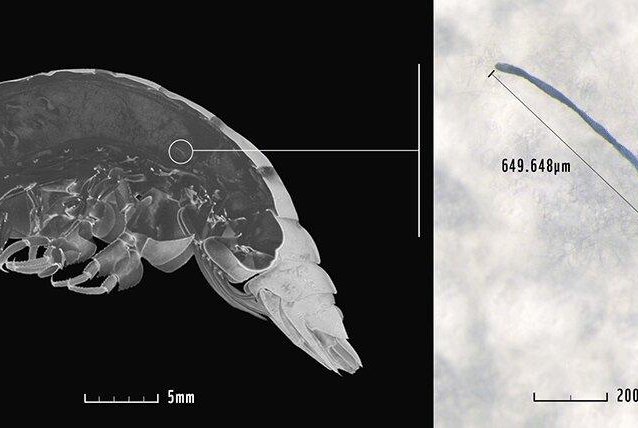Scientists found plastic fragments inside amphipods living between 3.7 and 4.3 miles beneath the ocean surface. Photo by Newcastle University
March 6 (UPI) -- Plastics are being ingested by amphipods living in one of the deepest places on Earth, the Pacific Ocean's Mariana Trench.
Amphipods, sometimes called hoppers, are tiny shrimp-like crustaceans. Though they are found in all aquatic environs, the majority of the roughly 9,900 known species are found in the ocean.
Recently, scientists found a new species living in the Mariana Trench, between Japan and the Philippines -- the ninth species in a genus of deep-sea amphipods. Scientists named the new species, Eurythenes plasticus, for the the contents of its digestive tract.
Inside the amphipod's body, scientists found polyethylene terephthalate, a synthetic compound used to make water bottles and workout attire. The plastic-eating amphipods were caught on baited lines between 3.7 and 4.3 miles beneath the ocean surface.
The discovery, described this week in the journal Zootaxa, confirms what other studies have suggested, that plastics pollution has made its way to the deepest parts of the ocean.
"We decided on the name Eurythenes plasticus as we wanted to highlight the fact that we need to take immediate action to stop the deluge of plastic waste into our oceans," lead researcher Alan Jamieson, senior lecturer in marine ecology at Newcastle University in Britain, said in a news release.
Much of the world's plastic waste gets exported to Southeast Asia, where recycling efforts are often lackluster. Lots of the plastic gets burned or dumped at repositories, and some of that waste ends up washed into the ocean. Over time, big pieces of plastic get broken down into smaller bits.
Marine animals ingest plastic particles on accident or mistake pieces of plastic for food. Previous studies suggest some animals, including certain coral species, seem to prefer plastic to real food.
As the latest research proves, some of the plastic particles filter down to the deepest parts of the ocean, where it gets ingested by amphipods and other miniature organisms.
"The newly discovered species Eurythenes plasticus shows us how far-reaching the consequences of our inadequate handling of plastic waste truly is," said Heike Vesper, director of the marine program at the World Wildlife Fund in Germany. "There are species living in the deepest, most remote places on earth which have already ingested plastic before they are even known about by humankind. Plastics are in the air that we breathe, in the water that we drink and now also in animals that live far away from human civilization."
Last year, the World Wildlife Fund initiated an international campaign for a global, legally binding treaty aimed at stopping plastic pollution from ending up the ocean.















